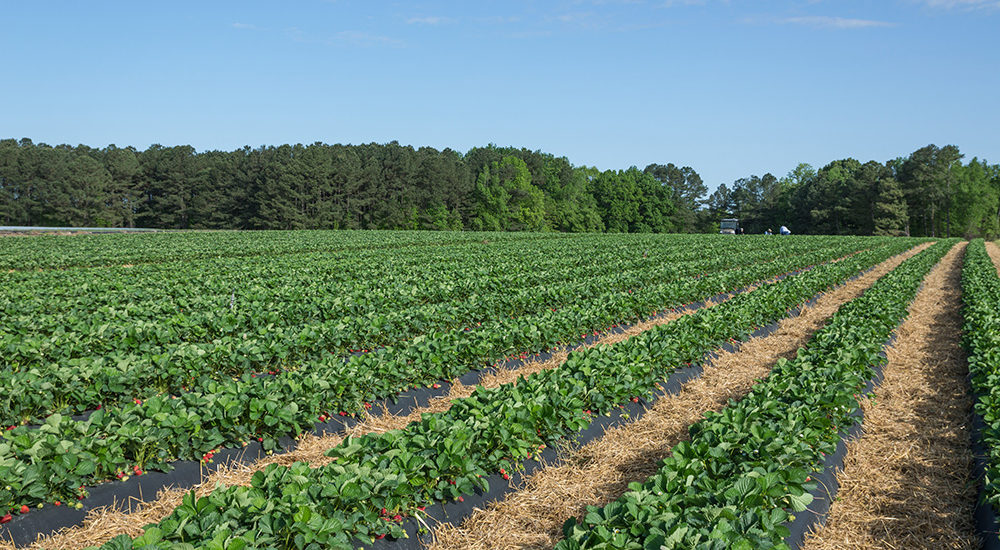By John Dean, Economic Development Manager
Lee County’s economic and cultural history is thick with agriculture. Whether a Lee County farmer grows vegetables, raises chickens, or produces tobacco, agriculture is a critical component of our local economy. According to the 2017 USDA Census of Agriculture, Lee County has 250 farms and 35,170 acres of farmland. The market value of the products sold by an individual farm in Lee county averages $217,567, leading to over $54 million in the total value of agricultural products sold from Lee County. Strikingly, while the number of acres farmed in Lee County is down 10% from 2012 (the year of the previous Census of Agriculture), average annual agricultural sales shot up a whopping 57% between 2012 and 2017. Unfortunately, not all farmers benefited from this jump in sales.
While many associate farming with larger-scale operations, nearly half (49.6%) of all farms in Lee County are under 50 acres in size. In fact, 42, or nearly 20%, of the county’s farms are under 10 acres. The scale of Lee County’s farms is even more striking when considering average annual sales. Although 29 (11.6%) farms in Lee County recorded sales of $100,000 or more in 2017, 106 (42.4%) of Lee County’s farms recorded annual sales of less than $2,500.
Many of these farmers benefit, or even rely on, direct-to-market sales. Rather than selling through a wholesaler or distributor, direct-to-market sales relies on the farmer and consumer relationship. Whether through a farmers market, community supported agriculture (CSA), or a roadside stand, among many other outlets, most farmers have relied on their neighbors for generations.
Fortunately for farmers whose sales rely on direct-to-market avenues, opportunities are only increasing. According to the Federal Reserve Bank of St. Louis, “The demand for regional food—or food produced in the same region in which it is consumed—has been on the rise. For example, direct-to-consumer sales of regional food has risen from $0.4 billion in 1992 to $1.3 billion in 2012.” This trend is pronounced in North Carolina, as well. According to NC State’s Center for Environmental Farming Systems, North Carolina saw a 120% increase in direct-to-consumer sales from 2012 to 2017 ($69,968,000 in 2017). More locally, Lee County experienced a 29% increase from 2012 to 2017 in direct-to-consumer sales, with direct sales in 2017 at $126,000.
Perhaps most exciting for the future of agriculture, North Carolina alone had 20,298 new and beginning farmers (those with less than five years of experience) join the ranks of producers. Here in Lee County, 123 new and beginning farmers are trying their hand in agriculture. While many of these farmers will take over their family farms, there will continue to be a substantial amount seeking new markets and alternative opportunities in the agricultural sector, whether through direct-to-market sales or other revenue sources, such as agritourism.
As a resident of Lee County, it remains important to stay connected to our agrarian past. As we loosen our relationship with the land, we all lose sight of where we came from and what has binded so many of our families and communities together for generations. With the new Pilgrims of Sanford Agricultural Marketplace set to open in the not-to-distant future, the result of a collaboration between the City of Sanford, Lee County, Downtown Sanford, Inc., Lee County Extension Center, SAGA, and many others, the community will once again have a space to celebrate our proud agricultural heritage. In the meantime, next time you drive by a roadside stand or have a chance to visit the Sanford Farmers Market, make sure to thank the farmers contributing to our local economy by spending a few extra dollars on our locally-produced foods.
Sources:
- USDA Census of Agriculture: https://www.nass.usda.gov/Publications/AgCensus/2017/
- Federal Reserve Bank of St. Louis: https://www.stlouisfed.org/on-the-economy/2017/december/economic-impact-locally-produced-food
- North Carolina Center for Environmental Farming Systems: https://cefs.ncsu.edu/
